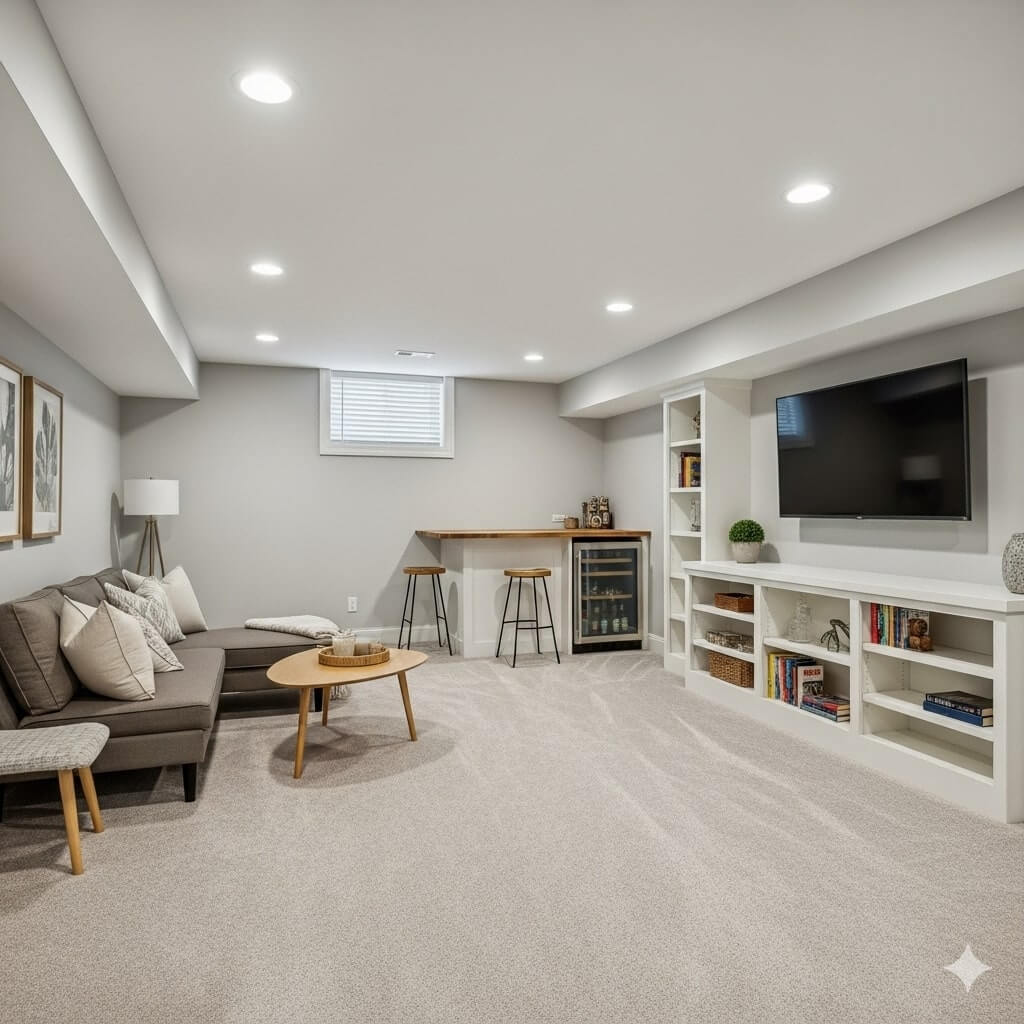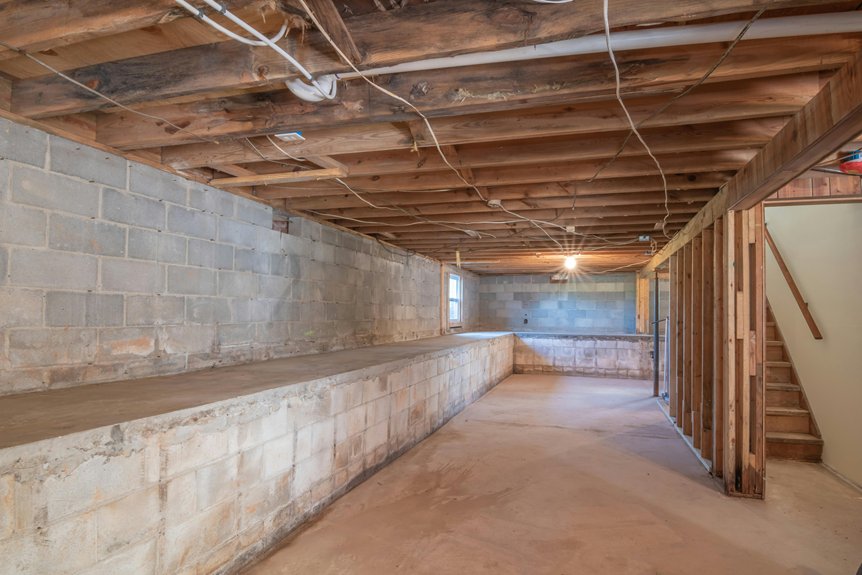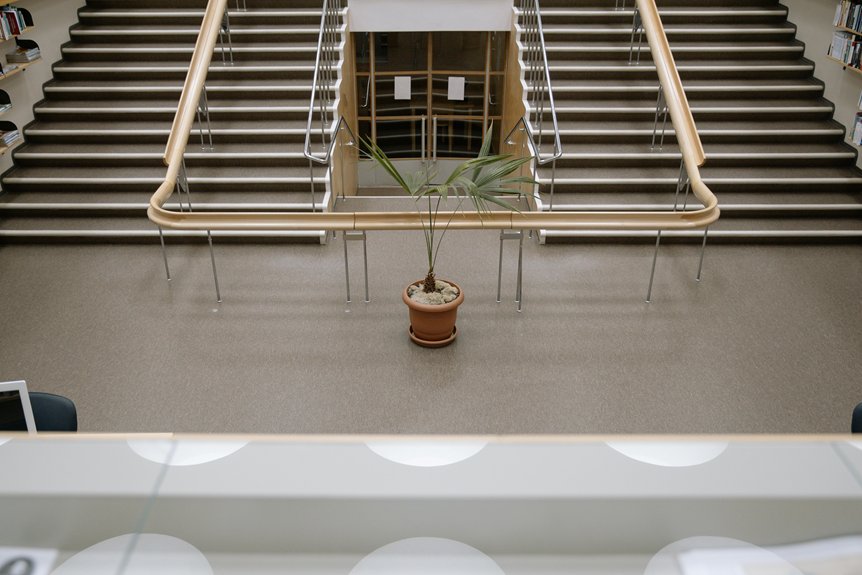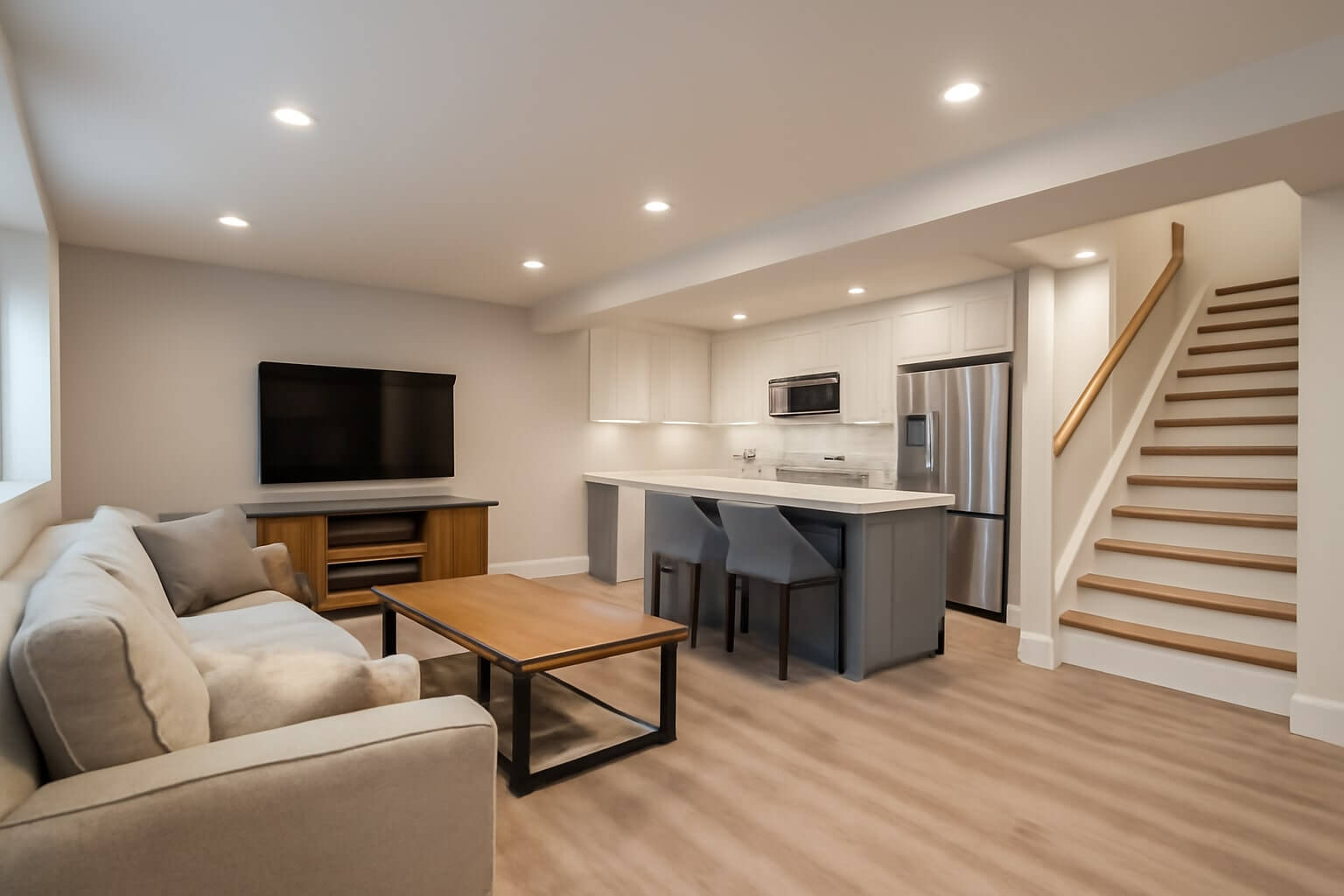If you’re looking to turn your basement into a practical and enjoyable space, a basic remodel can make all the difference. You’ll want to start by evaluating your layout and setting a realistic budget. From there, designing a functional space that meets your needs is essential. But before you jump into the fun details, there’s important groundwork to cover that could impact your entire project. Let’s explore how to set the stage for a successful remodel.
Key Takeaways
- Assess the current layout and establish a budget, accounting for materials, labor, and unexpected expenses.
- Design functional zones, maximize natural light, and address moisture and insulation needs for a comfortable environment.
- Choose a cohesive color palette and furniture that enhances both aesthetics and functionality in the basement.
- Add personal touches through artwork, textiles, and decorative pieces to create a warm, inviting atmosphere.
- Ensure compliance with local building codes by obtaining necessary permits and consulting with local planning authorities.
Assessing Your Basement Space

How do you envision your basement transforming into a functional space? Start by evaluating its current layout and identifying areas for improvement.
Consider the walls, flooring, and lighting to enhance basement functionality. Think about how you’ll utilize the space—do you need a cozy lounge, a home office, or a play area?
Enhance your basement’s functionality by evaluating walls, flooring, and lighting to create a cozy lounge, home office, or play area.
Measure the dimensions to maximize space utilization and guarantee you can fit essential furniture and fixtures comfortably. Identify any potential obstacles, like low ceilings or support beams, and plan accordingly.
With thoughtful evaluation, you can create a versatile basement that meets your needs and adds value to your home.
Establishing Your Budget
Before you start your basement remodel, it’s essential to establish a budget that covers all aspects of the project.
You’ll want to determine your total costs, allocate funds for essentials, and set aside some money for unexpected expenses that may arise.
Having a clear financial plan will help guarantee your project stays on track and within limits.
Determine Total Project Costs

As you plunge into your basement remodel, understanding the total project costs is crucial for making informed decisions.
Start by creating a detailed cost breakdown, listing expenses like materials, labor, and permits. This clarity helps you gauge the overall financial commitment.
Don’t forget to factor in potential unforeseen costs, as they can arise during renovations.
Utilize budget tracking tools or apps to monitor your spending throughout the project.
Allocate Funds for Essentials
While planning your basement remodel, allocating funds for essentials is key to keeping your project on track.
Proper fund allocation guarantees you cover the crucial aspects of your remodel. Here are four essential items you shouldn’t overlook:
- Framing and Drywall – Establish the structure and walls.
- Electrical Work – Guarantee safety and functionality with proper wiring.
- Plumbing – If adding a bathroom or wet bar, budget for plumbing needs.
- Flooring – Choose durable and attractive flooring options.
Plan for Unexpected Expenses
When budgeting for your basement remodel, it’s crucial to plan for unexpected expenses that can arise during the project.
These unexpected costs can quickly derail your plans if you’re not prepared. To safeguard your finances, create a budget cushion—typically around 10-20% of your overall budget.
This extra padding guarantees you can cover surprises like plumbing issues or structural repairs without stress. By anticipating these potential expenses, you’ll keep your project on track and avoid financial headaches.
Designing Your Layout
Designing your layout is one of the most essential steps in a basement remodel, and it can set the tone for the entire space.
To create an inviting and functional environment, consider these tips for layout inspiration and space optimization:
- Define Zones: Separate areas for lounging, working, or exercising.
- Maximize Natural Light: Use light colors and reflective surfaces.
- Plan for Storage: Incorporate built-ins or shelving to declutter.
- Consider Traffic Flow: Guarantee pathways are clear for easy movement.
Obtaining Necessary Permits

Before you start your basement remodel, it’s essential to research local regulations to guarantee your plans comply with building codes.
Once you know what’s required, you can submit your permit application to get the green light for your project.
Skipping this step could lead to costly delays, so it’s best to handle it upfront.
Research Local Regulations
While commencing your basement remodel, understanding local regulations and obtaining the necessary permits is essential to guaranteeing a smooth process.
Here’s how to research effectively:
- Check Local Building Codes: Review your municipality’s requirements to guarantee compliance.
- Understand Zoning Requirements: Determine what’s allowed in your area concerning basement usage.
- Consult the Planning Department: Speak with local officials for guidance and updates on regulations.
- Review Homeowners Association Rules: If applicable, check for additional rules that may impact your project.
Submit Permit Application
Having a solid understanding of local regulations sets the stage for the next step: submitting your permit application.
Start by gathering all necessary documents that meet the permit requirements. This may include architectural plans, contractor details, and any required inspections.
Next, fill out the application form accurately, ensuring all information is complete. Be prepared to pay any applicable fees during the application process.
After submission, keep track of your application’s status and promptly respond to any requests for additional information.
Once approved, you’re one step closer to transforming your basement into the space you envision!
Addressing Moisture and Insulation
When it comes to remodeling your basement, addressing moisture and insulation is essential for creating a comfortable, usable space.
Effective moisture control and choosing the right insulation types can make all the difference. Here’s how to get started:
Effective moisture management and proper insulation selection are crucial for a successful basement remodel.
- Inspect for leaks – Look for any signs of water intrusion.
- Install vapor barriers – Use polyethylene sheets to prevent moisture seepage.
- Choose insulation types – Consider foam boards or fiberglass batts for ideal thermal resistance.
- Ensure proper ventilation – Install vents or a dehumidifier to maintain air quality.
Taking these steps will help you create a dry and cozy basement environment.
Framing and Electrical Work

Framing and electrical work are essential steps in transforming your basement into a functional living space. First, use effective framing techniques to create walls and support structures that fit your design. Make certain you’re following local building codes for proper measurements and materials.
Next, focus on electrical safety; consult a licensed electrician if you’re unsure about wiring. Install outlets, lighting, and switches strategically to enhance usability and comfort. Don’t forget to include adequate circuits for any appliances you’ll use.
Installing Flooring and Finishes
Installing flooring and finishes is a crucial step in your basement remodel that can dramatically impact the room’s overall look and feel.
Choosing the right flooring options and finish materials will enhance your space. Here are some ideas to reflect upon:
Selecting the ideal flooring and finish materials will elevate your basement’s aesthetic and functionality.
- Vinyl Plank: Affordable, water-resistant, and easy to install.
- Carpet Tiles: Comfortable, warm, and customizable for design.
- Laminate: Durable and mimics hardwood at a lower cost.
- Tile: Stylish and moisture-resistant, perfect for areas prone to dampness.
Select the right combination to create a welcoming and functional basement that suits your lifestyle.
Furnishing and Decorating Your New Space

After laying down your flooring and finishes, the next exciting step is furnishing and decorating your new space.
Start with furniture selection that suits your style and function; consider versatile pieces like a sofa bed for guests or modular shelving for storage.
Choose color schemes that create the right mood—soft, neutral tones can make the space feel larger, while vibrant accents add personality.
Don’t forget about lighting; it can dramatically enhance your design.
Incorporate personal touches like artwork or family photos to make it feel like home.
With thoughtful choices, your basement will transform into a cozy retreat.
Conclusion
With careful planning and attention to detail, you can transform your basement into a stylish and functional space. By evaluating your layout, setting a budget, and addressing moisture issues, you’re setting the stage for success. Don’t forget to secure the necessary permits to keep everything compliant. Once you’ve framed, installed flooring, and added your personal touches, you’ll be ready to enjoy your new basement oasis. Immerse yourself, and watch your vision come to life!




